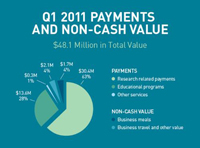Eli Lilly reported paying $48.1 million to 45,440 physicians and/or 1,827 healthcare organizations during the first quarter, most of it for research and education.
The majority—63%, or $30.4 million—went to hospitals or universities to cover costs associated with running clinical trials. Educational programs made up 28%, or $13.6 million, of doctor compensation, according to data released by Lilly for the first time as part of its obligations under a 2009 corporate integrity agreement with the federal government.
Since 2009 Lilly has been reporting fees paid to its faculty, a group which numbers between 4,000 and 5,000 docs who do commercial speaking, consulting and advising for the firm, explained spokesperson J. Scott MacGregor.
The newly launched registry, he said, includes payments to any physician in the US who received a transfer of value (TOV). Non-cash transfers of value, such as business meals (4%), travel expenses (4%) and other services (1%) account for the rest of Lilly’s physician compensation during the quarter.
It isn’t the first to start disclosing TOVs. Pfizer earlier this year quantified payments on research and TOVs, saying it paid out $177 million to nearly 200,000 healthcare professionals in 2010, with 61% of that having gone to clinical trials “and related research and development expenses.”
GlaxoSmithKline said it paid a total of $85.3 million last year to more than 5,000 US healthcare professionals for promotional talks or serving on advisory boards ($56.8 million) and to institutions for their help in conducting research ($28.5 million). And Merck said it paid $20.4 million last year to more than 2,000 US doctors and HCPs.
In 2013 companies will have to make TOV disclosures for payments made in 2012 under the Affordable Care Act’s sunshine provision. The Centers for Medicare & Medicaid Services pledged to issue an initial round of sunshine regulation this year.
Currently the law lists 14 natures of payment and TOVs that drug and device makers need to record. Except for samples, everything from food and entertainment to gifts, consulting fees and honoraria are included.
MacGregor said Lilly is preparing for the law’s implementation while also “trying to foster some better context and understanding around why we work with physicians to benefit patients.”







